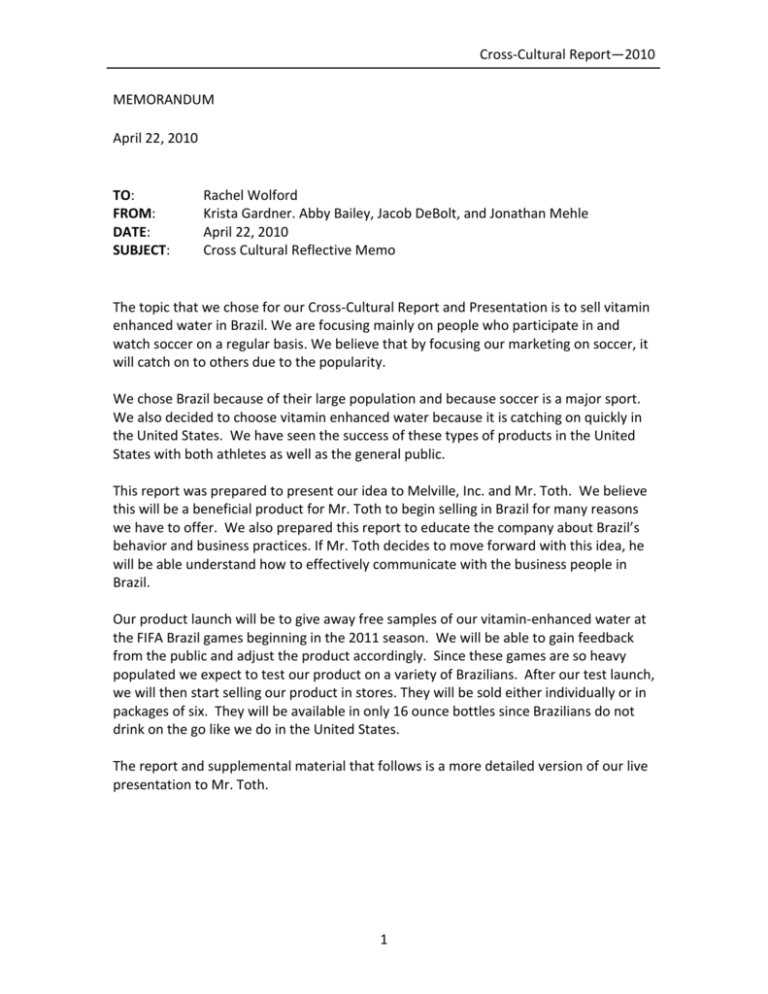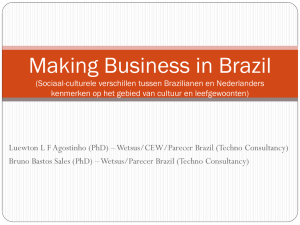BRAZIL CROSS-CULTURAL REPORT
advertisement

Cross-Cultural Report—2010 MEMORANDUM April 22, 2010 TO: FROM: DATE: SUBJECT: Rachel Wolford Krista Gardner. Abby Bailey, Jacob DeBolt, and Jonathan Mehle April 22, 2010 Cross Cultural Reflective Memo The topic that we chose for our Cross-Cultural Report and Presentation is to sell vitamin enhanced water in Brazil. We are focusing mainly on people who participate in and watch soccer on a regular basis. We believe that by focusing our marketing on soccer, it will catch on to others due to the popularity. We chose Brazil because of their large population and because soccer is a major sport. We also decided to choose vitamin enhanced water because it is catching on quickly in the United States. We have seen the success of these types of products in the United States with both athletes as well as the general public. This report was prepared to present our idea to Melville, Inc. and Mr. Toth. We believe this will be a beneficial product for Mr. Toth to begin selling in Brazil for many reasons we have to offer. We also prepared this report to educate the company about Brazil’s behavior and business practices. If Mr. Toth decides to move forward with this idea, he will be able understand how to effectively communicate with the business people in Brazil. Our product launch will be to give away free samples of our vitamin-enhanced water at the FIFA Brazil games beginning in the 2011 season. We will be able to gain feedback from the public and adjust the product accordingly. Since these games are so heavy populated we expect to test our product on a variety of Brazilians. After our test launch, we will then start selling our product in stores. They will be sold either individually or in packages of six. They will be available in only 16 ounce bottles since Brazilians do not drink on the go like we do in the United States. The report and supplemental material that follows is a more detailed version of our live presentation to Mr. Toth. 1 Cross-Cultural Report—2010 CROSS-CULTURAL REPORT ON BRAZIL Bringing Vitamin Enhanced Water to the Land of Soccer Prepared by Abby Bailey, Jacob DeBolt, Krista Gardner, Jonathan Mehle English 302 Students Report Distributed April 22, 2010 Prepared for Mr. Chris Toth CEO of Melville, Inc. 2 Cross-Cultural Report—2010 TABLE OF CONTENTS 3 Cross-Cultural Report—2010 EXECUTIVE SUMMARY This report presents the opportunity available to Mr. Toth to bring vitamin-enhanced water produced by Melville, Inc. to Brazil. It is a sports-loving nation open to change and we feel that this would be the ideal country to release such a product. This report will provide cultural information to help Melville, Inc. move into the Brazilian market gracefully as well as suggestions on how we believe the release should be executed. Culture in Brazil has many differences and it is important for business personal of America to understand these changes in order to connect on an appropriate level to the Brazilian clientele. Time awareness and personal space concepts are less formal and more lenient than they are here in the United States. However, hierarchy in business and culture, as well addressing a person is more formal than we may use to practicing. In the Brazilian business world it is important for them to get to know whom they are doing business with on a personal level as well as working directly with the same person every time and not with the entire business. Brazilians like to know whom they are dealing with and want somebody they can trust. In meetings it is seen as a sign of enthusiasm and not insult when someone interrupts a person or a presentation. However, it is seen as extremely rude and disrespectful for somebody to insult another person in any way. Just these few cultural differences can be major “make or break” situations if not handle the correct way. The understanding of these cultural differences will give Melville, Inc. a one up when entering business in Brazil as an American company. Since they are a hierarchy-based system, respect is an important attribute in anyone they are dealing with on a professional as well as personal level. Brazilians do not like to be rushed or talked to in an informal manner for just this reason. Based on the presented information we believe these recommendations for moving business to Brazil should be followed. Since the nation’s pride lies in the FIFA soccer team we feel free sample give-aways at these games would be a great way to promote the product. They have very high attendance and also tend to draw in an athletic crowd that may be interested in a vitamin-enhanced drink. Start with simple flavors such as fruit punch, lemon-lime, peach-mango and orange. If it goes over well add additional options at a later time. After the initial test run we suggest selling the product in 16 ounce bottles in packages of six. 4 Cross-Cultural Report—2010 BRAZIL CROSS-CULTURAL REPORT Introduction This research-based report examines cross-cultural differences in specific communication practices for the country of Brazil in order to gain better understanding of proper business conduct. The main goal of our research is to provide useful knowledge to Melville, Inc. that would offer direct support in case the company moves forward with their International expansion plans. Cultural Communication Focal Points of Study The cross-cultural communication report includes the following research subjects that were determined as most imperative when getting accustomed to the Brazilian business culture. The subjects of focused study appear in the following chronological order: Time Awareness Decision Making, Problem Solving and Negotiations Roles and Mannerisms Attitudes on Materialism Time Awareness Time awareness in Brazil is very different than what we are used to in the United States. Although employees are expected to be punctual and arrive on time it is very common for senior management and those who are higher up at a company to show up to a meeting or work at a later time than the others. They tend to come in to the office later than anyone else and stay well after everyone leaves for the evening. Since Brazil has a hierarchy based system it is not considered disrespectful for the leaders to do what ever they desire. Punctuality is not as rigid as what is typically expected in America. In general when scheduling a meeting or making an appointment a delay should be expected. People in Brazil usually deal with many different people and multiple problems at the same time instead of the typical United States way of setting aside specific time for individual people and issues. In the business world of Brazil it very important to socialize and get to know somebody you are doing business with before you engage in any work. They do not consider chat, banter or “getting straight to the point” as a waste of time like we might in the United States. In fact, Brazilians find it rude and offensive if you try to rush them off the phone or seem like you just want to get down to business. You run the risk of never hearing from the company again if you take this business approach with them. 5 Cross-Cultural Report—2010 They prefer face-to-face meetings and also prefer dealing with one individual person that they can trust versus a company image as a whole. Communication is typically casual and it is considered acceptable to interrupt somebody who is speaking if you believe you have something important to add to the conversation or presentation. However, criticizing somebody in the work place is not acceptable and it will reflect badly on the person who is breaking this unwritten rule. In social situations if you are invited to a Brazilian’s house arrive at least thirty minutes late if the invitation is for dinner. If the invitation is for a party or larger gathering it is normal to arrive at least an hour late. Decision Making, Problem Solving and Negotiations Solving problems and making decisions in Brazil are a little different than what the United States is accustomed to. It will usually take a great deal of time to review details and come to a decision. Usually the people that you are trying to make a decision with do not have authority to come to a decision. The highest-ranking person in the company typically makes the decisions because of the hierarchical system within their businesses. Brazilians also like to take their time. When coming to a decision it may take a while and you are advised not to rush them or appear impatient. This attitude may make you seem rude and in a hurry to get business done instead of building relationships. Since Brazilians like to get to know the company before beginning business, be expected to answer many questions during meetings. They want to gain this information because it makes them feel more comfortable with the people and the company they are doing business with. When negotiating with Brazilians, you want to make sure your company is sending the same people to deliberate. Brazilians like to communicate with people, not with a company. If you send different people each time, it may change their outlook on your company and you may have to rebuild the relationship from the beginning. It is advised to use a translator if you are not fluent in Portuguese and also to hire a local lawyer, since Brazilians do not care for outside legal presence. Brazil and the United States have a very good relationship. Brazil likes to cooperate with the United States and vice versa. Brazil’s president however, has recently made relations with neighboring countries in the Southern Common Market (Mercosul) his first priority, and has tried to make his relations with India and China stronger. It is believed that the ties the United States has with Brazil will strengthen particularly on energy issues. Brazil and the United states are also together on issues such as antiterrorism, human rights concerns, environmental issues, anti-narcotics, and HIV/AIDS prevention. 6 Cross-Cultural Report—2010 Roles and Mannerisms In Brazil it is important for men and women to act in different ways even though they are thought to be equal. First off when greeting one another men are to shake hands firmly and make eye contact with the other man, it is also not uncommon for men to shake at the forearm or the wrist. Also if they know you well enough and consider you a friend it is not on common for them to slap you on the back as a greeting. Women normally greet each other with a hug and press cheek to cheek on either side while kissing the air. Men are not supposed to shake hands with a women unless she extends her hand first otherwise men are just supposed to say hello to them. Personal space plays a more minor role during conversation. It is not uncommon for two individuals to stand a foot away from each other when talking. In fact, it is considered rude if one step back when either speaking or listening. This is in direct contrast to the unwritten personal space rules of the U.S. where a couple of feet, or what is referred to as a space “bubble,” typically separates two people speaking. The reason Brazilians interrupt you during meetings is because it is a sign of enthusiasm and it is very important not to get frustrated or angry if the other people in the meeting do interrupt you. This would not be considered acceptable in the U.S. where taking turns to speak is imperative. If conversation stalls in a pause, what may feel awkward to Americans is seen as normal from a Brazilian’s standpoint. The period of silence between two or more people may even last a long time. When conducting business with Brazilians it is also very important not to dive right into the topic of business because they do not like impatience. Most business meetings start with a light conversation that can go on for about a half hour. It is standard to wait for the Brazilian business people to bring up the topic to be discussed at the meeting. Since they like to take there time conducting a deal and getting to know their partners expect to spend a large amount of time and resources when conducting business with Brazil. When addressing others it is important to take a more formal approach than you would in the United States. The Brazilian culture is very accustomed to hierarchy both in the work place and the social world. They are defined by social status and age so using first names in the work place is seen as inappropriate by Brazilians. Use "senor" for males and "senora" for females before their surname and be sure to always address your Brazilian contact by their title. Do not ever use the "O.K." sign in public because in Brazil it is seen as a vulgar gesture and will not bode well for you in any business meeting. Instead use the traditional thumbs up if you are going to use any approval or enthusiastic hand gesture. Attitudes on Materialism 7 Cross-Cultural Report—2010 In Brazil they do not feel any ill will towards materialism and in fact expect both men and women to look very professional and well kept. When dressing for a business meeting it is preferable for executives to wear a three-piece suit. In general men should wear a conservative suit that is either charcoal grey or a darker color. For women it is important that they dress elegant and feminine and wear either dresses or skirts; slacks are not suggested. Top quality accessories and manicures are expected. Also, both sexes are to avoid wearing the colors of the Brazilian flag. Brazilians dress with a sense of style and flair and also tend to judges others on their appearance. It is important to remember that casual dress in Brazil is more formal than it would typically be in most other countries. Conclusion From this conducted report, we have determined that are significant differences amongst the United States and Brazil’s culture of communication. Time awareness and punctuality play a less significant role in the Brazilian’s business lives while socialization and building of relationships between a business and its partners is of high value. In the decision-making and negotiation stages, Brazilians typically spend a larger portion of time in their meetings before agreements are made while rushing through something is often ill-advised. The highest-ranked representative within a Brazilian company will also prefer face-to-face contact when making a business deal or forming a partnership with another firm. When meeting someone, the type of verbal greeting and physical contact made is dependent on any prior existing relationship as well as the sex of the other person. Brazilians also like to dress up formally and will wear the most respected of fashion brands to portray their status in a society. We hope that these findings will provide useful information to Melville, Inc. and hope they serve as an instrumental tool in International operations expansion. Recommendations We would like to introduce your product into Brazil before the 2011 FIFA soccer season. This would make extensive amount of time for the product to grow before the 2016 Olympics. We believe the best way to introduce this product is to give out free samples during the soccer games. We suggest starting out with simple flavors such as: fruit punch, lemon lime, peach mango, and orange. When conducting business meetings, be sure to travel to Brazil to have meetings face to face. Be sure to hire a translator and a lawyer inside the country of Brazil. You should 8 Cross-Cultural Report—2010 bring product samples to the business meetings. This allows your potential partner to visually approve of the product. When showing business cards, be sure to have one side in English and the other in Portuguese. Also, when giving a business card, be sure that the Portuguese side is facing up. 9 Cross-Cultural Report—2010 WORKS CITED "Brazil- Language, Culture, Customs and Etiquette." Kwintessential. Web. 12 Apr. 2010. <http://www.kwintessential.co.uk/resources/global-etiquette/brazil-countryprofile.html>. Thomson, Shelia. "Doing Business in Brazil." Crosscultural Maria-Brazil. Feb. 2010. Web. 12 Apr.2010. <http://www.maria-brazil.org/business_in_brazil>. Nicol, Joni. "Brazil Business Etiquette, Manners, Cross Cultural Communication, and Geert Hofstede Analysis." International Business Etiquette, Culture, Manners and Geert Hofstede Cultural Analysis for Global Business Students & Managers. Web. 13 Apr. 2010. <http://www.cyborlink.com/besite/brazil.htm>. "Brazil Etiquette Tips, Brazil Etiquette Dos and Don'ts from Vayama." Cheap International Airline Tickets, International Flights, International Flight Deals Vayama. Web. 13 Apr. 2010. <http://www.vayama.com/etiquette/brazil/>. Malinak, Cora. "Doing Business In Brazil/ Brazilian Social and Business Culture."Comunicaid.com. Web. 13 Apr. 2010. <http://www.communicaid.com/access/pdf/library/culture/doing-businessin/Doing%20Business%20in%20Brazil.pdf>. "Brazil (02/10)." U.S. Department of State. Web. 21 Apr. 2010. <http://www.state.gov/r/pa/ei/bgn/35640.htm>. "Brazil- The Structure of Poverty." Low Income Households. Web. 21 Apr. 2010. <http://pdf.wri.org/hammond_brazil_profile_xls.pdf>. "LDLD: Brazil. Cultural Differences. NonVerbal Communication." ELL Assessment for Linguistic Differences vs. Learning Disabilities. Lesley University, 2005. Web. 13 Apr. 2010. 10






